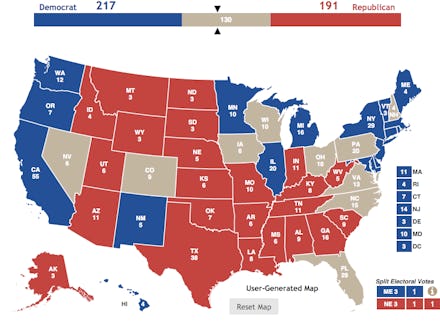Swing States: States That Can Decide the 2016 Presidential Election

A handful of states, during the course of every presidential campaign, become an unusually BFD to the rest of the Union. Called swing states, these holdouts cannot be relied upon to vote definitively Democratic or Republican, but can heavily influence the outcome of an election, depending on whether they swing red or blue. A candidate needs 270 electoral votes to win the presidency, and the votes in the swing states are up for grabs. These are the areas that candidates will target most aggressively, and the ones everyone will be watching from the start of primary election season in February all the way through election night.
Reporting on a study conducted by the Center for American Progress and William Frey of the Brookings Institute, National Journal cites 11 battleground states as the ones to watch in the 2016 election. Here's a look at how things have shaken out in each throughout the past three elections, based on data from the Cook Political Report and the Rothenberg & Gonzales Political Report.
Nevada
Nevada gets six electoral votes, and so far, Rothenberg & Gonzales reports it's leaning towards the Democrats. According to Cook data, 52.4% of Nevada's voters went with Obama in 2012, versus 45.7% for Mitt Romney. In 2008, 55.2% voted for Obama over John McCain, but in 2004, the state went Republican, choosing George W. Bush over John Kerry, 50.5% to 47.9%.
Florida
The Sunshine State has proved decisive in elections before, most notably in the Bush-Gore race of 2000, when hanging chads won George W. Bush a recount within the state and, it's been argued, the presidency. R & G lists Florida as a "pure toss up," while the Cook report says it came in on Obama's side in 2012 after a close race. In the two elections before that, Florida voted for Obama over McCain and Bush over Kerry. Florida has 29 electoral votes.
Colorado
Obama won in Colorado in both 2012 — with 51.5% of the vote to Romney's 46.1% — and in 2008, but in 2004, the state went to the Republicans. R & G classifies it as a toss-up for 2016. It holds nine electoral votes.
Virginia
Virginia, with 13 votes, is another toss-up. It went with Bush in 2004, and Obama in both 2008 and 2012, when he received 51.2% of the state's vote against Romney's 47.3%.
North Carolina
North Carolina skewed Republican in the last election, electing Romney 50.4% to 48.4%. In 2008, Obama won the state by a the slimmest of margins, while Bush won in 2004. North Carolina gets 15 votes and is, according to R & G, is a toss-up state tilting toward the GOP. Real Clear Politics has Donald Trump in the lead for the Republican candidacy in North Carolina, and Hillary Clinton in the lead for the Democratic candidacy.
Pennsylvania
Pennsylvania is reportedly leaning Democratic. It has 20 votes, and has gone with the Democratic candidates in the last three elections.
Wisconsin
R & G calls Wisconsin a toss-up state that's tilting Democratic. It came in for Obama with 52.9% in 2012, and elected him in 2008 as well. In both the 2008 and 2004 elections, Wisconsin — which gets 10 electoral votes — went with the Democrats.
Iowa
Iowa is the first big prize. R & G reports that it's leaning Democratic, and indeed, it went to Obama in both 2012 and 2008. In 2004, however, Iowans went with Bush over Kerry. The state holds six electoral votes, but is the first primary of the season. The Iowa caucus is a crucial factor in deciding who each party will elect as its candidate. In advance of the caucus, Real Clear Politics puts Sen. Ted Cruz in the lead for the Republican nomination and Clinton in the lead for the Democratic nomination.
Michigan
With 16 electoral votes, Michigan went to the Democrats in 2012, 2008 and 2004. R & G reports that it's Democrat-favored for the upcoming election.
Ohio
Ohio went to Bush, with 50.8%, in 2004, and to Obama in 2008. It elected Obama a second time in 2012, but is currently a toss-up, according to R & G. It gets 18 votes.
New Hampshire
Alongside Iowa, New Hampshire is a big-deal state for would-be presidents. It has only four electoral votes, but according to the L.A. Times, its undecided voters could be a "key wild card" in the Feb. 9 primary. In 2012 and 2008, it went with Obama; in 2004, New Hampshire went to Kerry. R & G says it's tilting toward the Democrats. Real Clear Politics puts Trump in the lead for the Republican candidacy in the New Hampshire primary, and Bernie Sanders in the lead for the Democratic.
So far, Rothenberg & Gonzales is forecasting the 2016 electoral college numbers as Democrat-favorable, but it will likely come down to how a few key states vote.